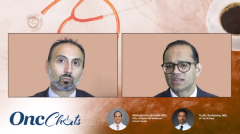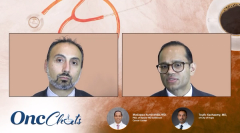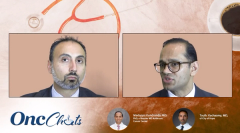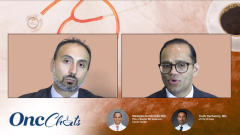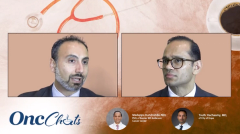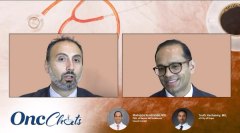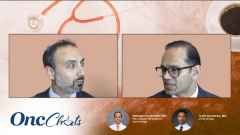
Understanding Endoscopy in the Realm of GI Cancers: Endoscopic Cancer Resection
In this fourth episode of OncChats: Understanding Endoscopy in the Realm of GI Cancers, Madappa Kundranda, MD, PhD, and Toufic A. Kachaamy, MD, provide insight on the use of endoscopic submucosal resection and endoscopic evaluation for tumor response as it pertains to organ preservation in gastrointestinal cancer.
Episodes in this series

In this fourth episode of OncChats: Understanding Endoscopy in the Realm of GI Cancers, Madappa Kundranda, MD, PhD, of Banner MD Anderson Cancer Center, and Toufic A. Kachaamy, MD, of City of Hope, provide insight on the use of endoscopic submucosal resection and endoscopic evaluation for tumor response as it pertains to organ preservation in gastrointestinal cancer.
Kachaamy: I agree on this definition. For example, in endoscopic oncology, cancer diagnosis [and] staging is well known to most people. Moving forward in that definition, what can you tell us about endoscopic cancer resection?
Kundranda: At this time, especially with the focus being on organ preservation, nonsurgical techniques are playing a huge role—especially if the outcomes can be preserved, such as survival. That’s where endoscopic interventions come into play. This year’s Gastrointestinal Cancers Symposium started with a session on endoscopic submucosal resection [ESD]. Endoscopic mucosal resection started by removing early cancers which are less than 2 cm; ESD removes the size limit from this whole equation. Early-stage colon cancer and esophageal cancer can now be routinely endoscopically resected.
This was first started in Japan, and ESD is now gaining more ground in the west. Recently, [ESD] has [also] become reimbursable. This expertise is now a lot more widespread than it previously was. For example, in a patient with esophageal adenocarcinoma that is diagnosed as a T1a and 0, the standard of care is endoscopic resection. However, if at the final pathological staging, it ends up being greater than [T]1a, such as a [T]1b, then you still have that surgical oncologist, the thoracic surgeon, on board to intervene and then take care of it—whether it’s the minimally invasive esophagectomy [or not]. This stepwise fashion can certainly help in improving quality of care; [it also allows for] organ preservation [to] still [be] kept [as a] focus, and the center of all this care.
Kachaamy: So [with this approach, we are] improving quality of life without compromising the oncologic outcome.
Kundranda: That is right.
Kachaamy: Now, what about the role of endoscopy in the assessment of tumor response? Where do you find that important?
Kundranda: Yeah, so again, this goes back to the same paradigm of organ preservation. With younger patients being diagnosed early, quality of life [in] these patients [who] live for a much longer time makes a huge difference. One of these perfect examples is patients with rectal cancer where an organ preservation and prevention...is a key part of it. So, in these areas, wherein with neoadjuvant therapy, if the patient has a complete clinical response, defining the complete clinical response is important. The way we currently do that is both by imaging modalities and by endoscopic evaluation. These patients will need more frequent evaluations for the first 2 years to detect early recurrence. You also must have an endoscopist that is familiar with the criteria for complete clinical response, and then more importantly, to know what to watch for during surveillance to ensure that the outcomes are as good with nonoperative management as opposed to operative management and the prevention of sphincter-sparing surgeries.
Kachaamy: Now, [let’s shift to the] management of systemic therapy[—associated] adverse effects [AEs]. Everyone knows that systemic therapy has gastrointestinal [GI] AEs. However, with the proliferation of the use of immunotherapy, we’re seeing a surge in immunotherapy-related GI AEs. Do you find that the gastroenterologist in general is familiar with the diagnosis and management of immunotherapy-related AEs?
Kundranda: That’s a great question. So, typically, at a comprehensive cancer center, wherein the care is multimodal in nature, the gastroenterologists are familiar [with these toxicities]. However, the practical aspect of this is, in the world of gastroenterology care, cancer care is a small portion of that practice. Hence, it’s important for the oncologist and the gastroenterologist to collaborate to provide the best care for these patients with complex diseases.
Check back on Wednesday for the next episode in this series.


